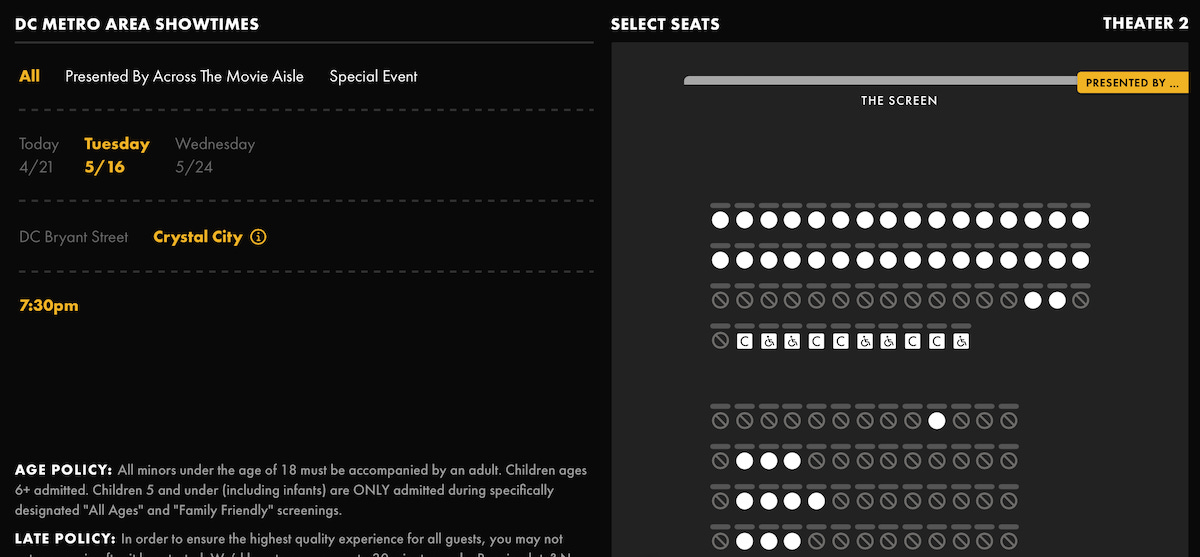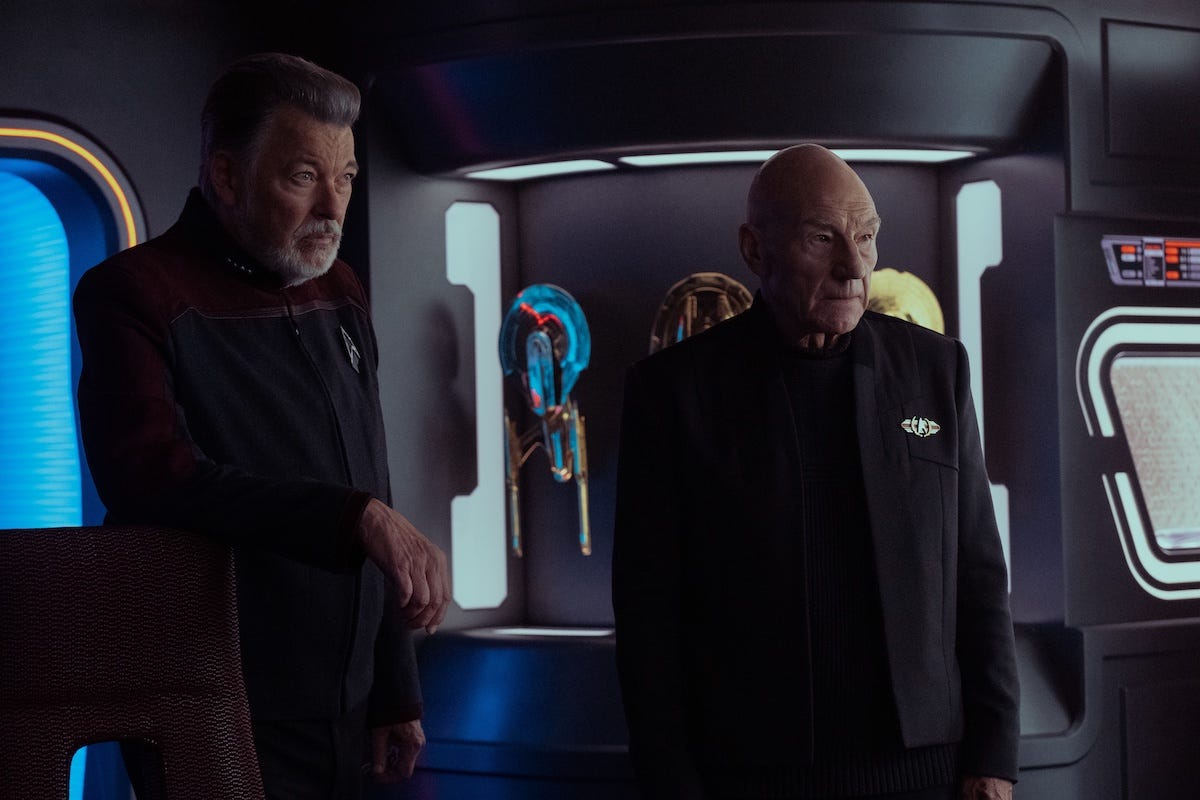Before we get started, I hope you’ll give this week’s bonus episode of Across the Movie Aisle a listen; we’re listing the best movies of the century (so far!) and our list is way better than The Hollywood Reporter’s list. I also hope you’ll join us for the live taping on May 16 at the Crystal City Alamo Drafthouse, where we’re hosting a screening of Wargames (1983) and discussing the apocalyptic moment in 1980s cinema. Tickets are just $7 and they’re going fast (last I checked the showing was 60 percent sold … better hurry if you want to sit in the stadium-seating part of the auditorium). The Drafthouse site is a little tricky, but click here, scroll down to where you can buy tickets, click “Tuesday 5/16,” click “Crystal City” and then choose your seat on the map at the right. It looks like this right now: Like I said, tickets are going fast! Many people were surprised to learn that Netflix was shutting down its DVD-by-mail operation because, hardy-har-har, they were surprised to learn it still existed, period. And that’s all well and fair; even I, a noted advocate for the pleasures of social media, had long ago ditched the DVD-by-mail portion of Netflix.¹ But the passing of Netflix’s DVD arm is notable and sad for the finality and totality of the shift from analog (or, well, physical) to digital that it represents. And that’s worth considering briefly, because while the shift from physical brings certain benefits (streaming is instantaneous and high quality) it also has some decided drawbacks. The reason Netflix could exist as a business at all is thanks to something called the first-sale doctrine. Without the first-sale doctrine, you wouldn’t have libraries and you wouldn’t have Blockbuster renting out tapes and you wouldn’t have Netflix mailing DVDs. The first-sale doctrine says, simply, that once you have purchased an object you can do with that object as you please. You can let a friend borrow it or you can resell it on the secondary market or you can lend it to a customer for a fee over a period of time. The video rental business arose almost entirely because, once upon a time, VHS tapes were prohibitively expensive (like, $90-$120 a tape) thanks to studio worries about cannibalizing their theatrical bottom line. A video rental operation would buy a bunch of $90 tapes, rent them out for $5 a pop (and, often, $5 in late fees when you forgot to bring it back on time), and make up the $90 over the course of weeks and months. Importantly, this only applied to the copy you bought: you couldn’t duplicate it and then rent it out or sell the dupe. Because first-sale doctrine was, functionally, limited by the idea that you were losing something if you gave up possession of it. In an age of infinite and free reproduction—like, say, the digital age—first-sale doctrine gets tricky. DVD Netflix worked like any other business governed by the first-sale doctrine: Netflix bought a thousand copies of, I dunno, Zoolander and then sent them to members by mail, who then sent them back. Whether that entailed dealing directly with the studio or going to 100 Best Buys and buying 10 copies at a whack, it didn’t matter. But Streaming Netflix couldn’t work that way. With streaming, you weren’t paying for a physical disc that you could do whatever you want with, you were paying for a license to show it to, theoretically, a million people simultaneously. Early in the Streaming Netflix era this was fine because there weren’t many competitors and Netflix was throwing bucketsof money at companies to get their movies on streaming. (How the studios sowed the seeds of their own hardship is a newsletter topic for another day.) But in the modern streaming era this is a modest annoyance for viewers who now have to research where a movie is streaming. And sometimes it’s a disaster for viewers, as the movie in question might not be streaming at all, as streaming rights not-infrequently get held up for reasons that are at best opaque and at worst unresolvable. (Try to find Kevin Smith’s Dogma on a legal site, and then Google why you can’t. Gonna be a while before that one shows up, probably.) Anyway, there are other reasons it’s unfortunate that DVD-by-mail is going the way of the horse and buggy (believe it or not, there are still people who live in a place where they simply cannot access high-speed internet). But the evolution away from first-sale doctrine to negotiated streaming rights has made things somewhat more complicated for viewers and businesses alike. Links!DVD Netflix wasn’t all roses, of course; check out Peter Labuza’s Substack on the ways in which Netflix skirted the law to make its business model work. This week I reviewed Evil Dead Rise. I liked it, but it did get me thinking about what, exactly, an Evil Dead movie is supposed to be. Really enjoyed previewing the summer box office with Frank Pallotta on The Bulwark Goes to Hollywood last week; tomorrow I’ve got an episode with David Herrin of The Quorum dropping focused on a new study about consumer behavior at movie theaters. That’ll pop into your inbox tomorrow or you can sign up on iTunes here. And if you wouldn’t mind leaving a rating/review, it’d really help. It will be interesting to see how this whole Jonathan Majors situation plays out. I figured something was up earlier in the week when a bunch of his reps dropped him. I’m excited to dig into Chris Cillizza’s book on sports and politics, Power Players. It’s out now and burning up the Amazon charts. Assigned Viewing: Picard (Paramount+)I didn’t watch season one or season two of Picard because I’d heard mixed-to-bad things. But then people started buzzing about season three, so I checked it out. And let me tell you: I’ve never felt more pandered to in my life and I loved every second of it. It’s just reference after reference to the original run of TNG (with a healthy dose of Dominion War stuff from DS9 tossed in for good measure). It’s like someone sat down and said “The piggies just want nostalgic slop, so we’re going to give them as much nostalgic slop as we possibly can.” As a piggie myself, all I can say is thank you. Shove more memories down my gullet, I can take anything you can dish out. 1 Why? Honestly, it came down to image quality: Blu-rays weren’t always available via Netflix and I got to the point in my life where I’d literally rather just pay for an instant HD stream on Amazon’s video rental service than wait for several days for a 480p disc to show up in the mail. If you’ve made it all the way down here, you love the newsletter. Help keep it sustainable by become a paying subscriber. You can update your newsletter preferences as often as you like on your personal My Account page. Catch up on the latest Bulwark+ member newsletters and podcasts, here. And feel free to drop us a note anytime by simply replying to one of our emailed newsletters. |




